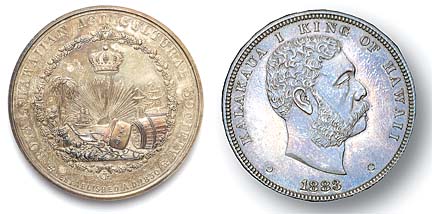Damon coins
could fetch $2M
The estate's collection includes a rare 1880
Hawaii $10 bill that escaped a U.S. recall
For 80 years since Samuel Mills Damon's death, his estate has placed a value of about $9,000 on his 6,000-piece coin collection, said Tim Johns, Damon Estate chief operating officer.
When the collection is put on the auction block early next year, it is expected to sell for between $1.5 million and $2 million.
The collection includes a very rare uncanceled 1880 Kingdom of Hawaii $10 bill; the only known 14-piece gift set of 1876 U.S. proof coins; and other rare Hawaiian, American and foreign coins and medals.
Besides the $10 bill and 1876 coin proof set, "the eight 1883 Hawaiian silver dollars are attracting a great deal of interest," said Louis Webre, spokesman for the auction house, Doyle New York.
Following Damon's death in 1924, the collection has been kept out of public view in a safe deposit vault. The only opportunity for anyone to see the collection was when the estate performed inventory. The last inventory was done 10 to 15 years ago, Johns said.

|
"No one had access to the inventory (list), so collectors had no idea what was in the collection," he said.
Johns said people approached the estate over the years offering to market the collection based on rumors of what was in it. But the estate felt the collection should be kept private, he said.
The estate is selling the collection as it prepares to shut down and distribute its assets to Damon's beneficiaries. Johns said he would prefer to sell all the coins as one complete collection if it will bring in a higher price.
Don Medcalf, owner of Hawaiian Islands Stamp and Coin, said the estate let him examine the collection before it was sent to the mainland for grading. He said the Hawaiian $10 bill should fetch a high price because it is rare and is in good condition. The Hawaiian Kingdom minted bills in denominations ranging from $10 to $500 that were recalled and canceled when Hawaii became part of the United States, he said.
There are only two other known uncanceled 1880 Hawaiian $10 bills. One is in Bishop Museum and the other is in a private collection in Europe.
The 1876 proof U.S. coins were boxed as a set, and it was given as a gift from Fireman's Fund Insurance Co. to John Paty, said Norman Scrivener, Doyle consultant and the auction's specialist in charge. Paty, Damon and Charles Reed Bishop were partners in Bank of Bishop & Co., which would later become First Hawaiian Bank.
"I know of no other gift boxes out there," Scrivener said.
He said the $1.5 million to $2 million estimate is conservative.
Prior to the recent liquidation of its assets, the Damon Estate was the state's fourth largest private landowner, with holdings on Oahu and the Big Island. It also held more than $500 million worth of shares in BankWest Corp., First Hawaiian's parent company.
Damon's last surviving grandchild, Joan Damon Haig, died last year, triggering the estate's termination.
E-mail to City Desk
[News] [Business] [Features] [Sports] [Editorial] [Do It Electric!]
[Classified Ads] [Search] [Subscribe] [Info] [Letter to Editor]
[Feedback]
